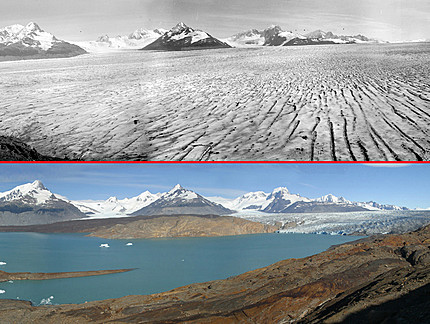Bill Cronon: Secular Apocaplyse

I saw this photo a couple of days ago. It's a comparison of the state of a Chilean glacier in 1928 with 2004. The glacier is retreating by 14 metres per year, attributed by scientists to a warming of the global climate. At that rate of retreat the it could be gone in 25 years. Look at that panorama though - would't it be great to go and see that before it's gone? Imagine if you were stood there confronted by this awesome sight, what would you be thinking? Greenpeace have been pretty sneaky though (as they have a right to be). Using those beautiful photos that would stick in my mind; when I arrived at that vista I might just think, "I contributed to this".
I made a point of going to see Bill Cronon at the Thursday morning plenary "Narrative of climate change" at the RGS conference. He suggested that narratives of climate change have been used as both prediction AND (secular) prophecy. This idea of a secular prophecy comes from recent intonations of Nature as a secular proxy for God. Prophecies are often told as stories of retribution that will be incurred if God's laws were broken. If Nature is a proxy for God then Climate Change is portrayed as a retribution for humans breaking the laws of Nature.
Cronon suggests that Global Narratives are abstract, virtual, systemic, remote, vast, have a diffuse sense of agency, posses no individual characters (i.e. no heros/villains), and are repetitive (so boring). These characteristics make it difficult to emphasise and justify calls for human action to mitigate against the anthropic influence on the climate. Cronon suggests these types of prophetic narrative are 'unsustainable' because they do not offer the possibility of individual or group action to reverse or address global climate problems, and therefore are no use politically or socially.
Coronon went on to discuss the micro-cosms (micro narratives) Elizabeth Kolbert uses in her book "Field Notes from a Catastrophe" to illustrate the impacts of global change in a localised manner. She uses individual stories that are picked because they are not expected, they are non-abstract and the antithesis of the unsustainable global narratives. He concluded that we need narratives that offer hope, and not those tied to social and political models based on anarchic thought that do not address the systemic issues driving the change itself. This is the political challenge he suggests - to create narratives that not only make us think "I contributed to this" when we see evidence of glacier retreat, but that offer us hope of finding ways to reduce our future impact upon the environment.
Labels: Academic, Environmental, Geographic, Philosophical, Political, Social, Sustainability

This work by James D.A. Millington is licensed under a Creative Commons Attribution-Noncommercial-Share Alike 3.0 United States License.


1 Comments:
Hi James,
Nice that you like Cronon, he is one of my favorite writers. I mean, I don't always agree with him but he writes so well.
I hope we can talk about him one day.
Post a Comment
<< Home